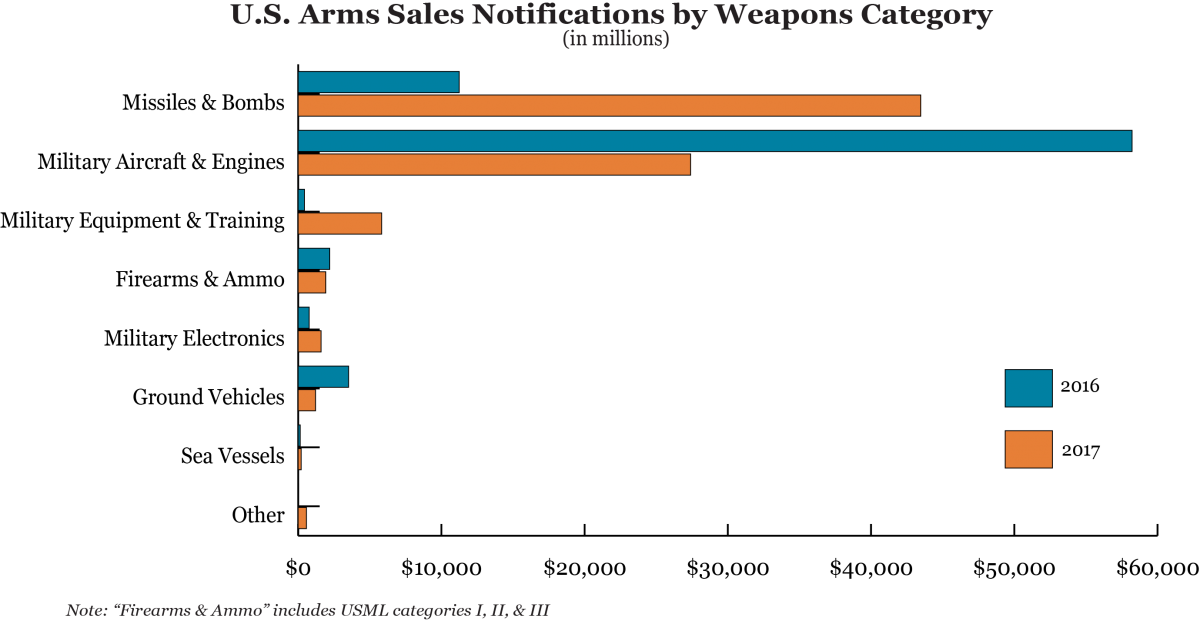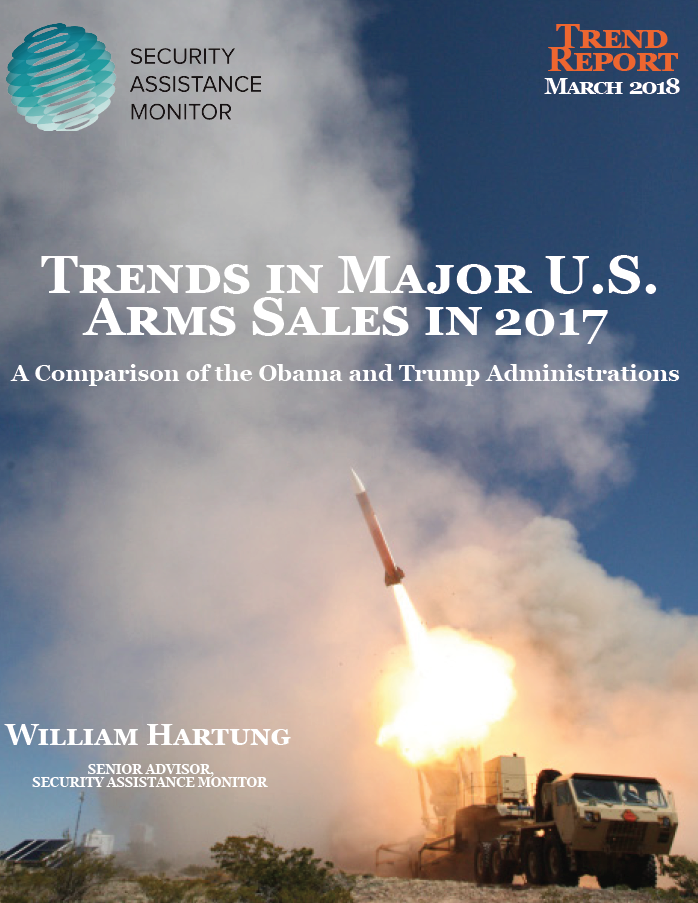Trump Makes Over $80 Billion in Major Arms Deals in First Year
Trump Makes Over $80 Billion in Major Arms Deals in First Year
Major Changes in Types of Weapons and Recipient Countries Compared to Obama
Puts U.S. Manufacturing Jobs and Human Rights at Risk
A report released today by the Security Assistance Monitor (SAM) program of the Center for International Policy documents over $80 billion in U.S. arms sales notifications to Congress during the Trump Administration’s first year in office. The Trump Administration total of $82.2 billion for 2017 slightly exceeded the Obama Administration’s total of $76.5 billion for 2016, and was more than $20 billion less than the peak year of the Obama Administration’s major arms sales offers in 2010.
Some of the biggest differences in major arms sales offers in 2017 compared to previous years are the types of weapons. The bulk of major arms offers during President Obama’s final year focused on sales of military aircraft. In contrast, the largest category of arms sales offers under the Trump Administration has been bombs and missiles, driven by major missile defense deals with Saudi Arabia, Poland, Romania, Japan, and the United Arab Emirates. Overall, the Trump Administration proposed 40 notifications in this category, which is a 30 percent increase over 2016.

There were notable differences between the Trump and Obama Administration on human rights. In 2017, the Trump Administration lifted Obama-era suspensions on specific arms deals to Saudi Arabia, Bahrain, and Nigeria. “Signing off on missile and bomb sales to Saudi Arabia when the country was using these weapons to attack the civilian population in Yemen sent an alarming signal about the U.S. support for human rights,” said Colby Goodman, the Director of the Security Assistance Monitor and editor of the report.
A key reason President Trump touted arms sales in 2017 was to create “jobs, jobs, jobs,” as the President put it during a visit to Saudi Arabia in May of 2017. However, the Trump Administration approved 16 deals in 2017 and eight in January 2018 to help foreign countries create arms manufacturing jobs in their countries. “This is not the ‘America First’ economic policy that has been touted by the Trump Administration,” notes William D. Hartung, the author of the new report, entitled Trends in U.S. Arms Sales 2017: Comparing the Obama and Trump Administrations. “These deals may also cut U.S. manufacturing jobs in the future with increased competition from overseas.”

This report is made possible because of improvements in the transparency of U.S. arms sales notifications in recent years. But while some types of arms sales transparency is up, export controls may be going down as the Trump Administration seeks to reduce restrictions on firearms exports, including removing notifications to Congress on firearms sales. There are also reports about expediting the approval process for the Pentagon’s Foreign Military Sales (FMS) system.
In 2017, the Trump Administration sent firearms sales notifications to Congress for 25 different countries, including to countries such as Bahrain, El Salvador, Honduras, Turkey, and the United Arab Emirates where there are heightened human rights risks. “Congress has played a key role in halting questionable firearms sales abroad in the past few years,” said Colby Goodman. “Eliminating this critical authority undermines Congress’s intent to provide more oversight on a category of weapons that often claims more lives in a year than any other type of arm.”
Other major findings of the report include:
- The Trump Administration’s top ten recipients of U.S. arms sales notifications in 2017 were in order: Saudi Arabia, Poland, Japan, Canada, Romania, Bahrain, Australia, United Arab Emirates, Greece, and Singapore. This is strikingly different than the top ten countries in 2016: Qatar, Kuwait, Japan, United Arab Emirates, Saudi Arabia, United Kingdom, Iraq, Australia, Norway, and Germany.
- The reported suspension of the Boeing F-18 fighter jet sale with Canada will result in Canada dropping out of the top 10 in 2017. Last year, the Canadian government publically excluded Boeing from its fighter jet competition after Boeing initiated a tariff action against a Canadian aviation competitor that was strongly backed by the Trump Administration.
- Other notable arms sales offers under the missiles and bombs category are for Bahrain, Kuwait, Singapore, South Korea, and Taiwan. The Trump Administration proposed nearly $952 million in missile and torpedo deals for Taiwan in 2017 to help counter threats from China.
For a complete list of all U.S. arms sales notifications in 2016 and 2017, please see SAM's fact sheet accompanying this report. All of the U.S. arms sales notification data has also been uploaded to SAM's one-of-a-kind U.S. arms sales database, which allows users to sort the data by region and program (chose notifications and the year in the filter section).
The Security Assistance Monitor (SAM) is a program of the Center for International Policy focused on enhancing transparency and oversight of U.S. foreign security aid and arms sales. By providing comprehensive U.S. security assistance data and by conducting independent, data-driven research, we seek to inform and elevate the debate among civil society, journalists, scholars, and policy makers in the United States and abroad about the risks and best uses of U.S. security assistance to improve human security.
For additional information or interview requests, please contact Bill Hartung at 917-923-3202 or Colby Goodman at Colby@ciponline.org or 202-232-3317 ext. 113. Click here to sign up for the Security Assistance Monitor's Weekly Monitor.
Click below for report:
*updated May 21, 2018

